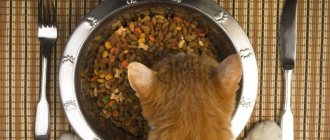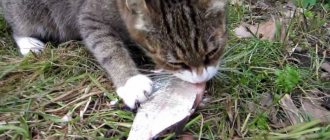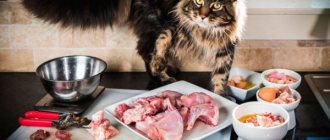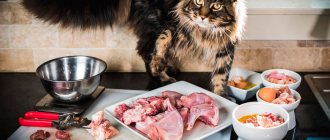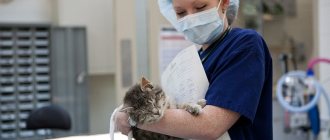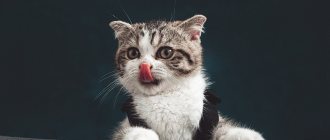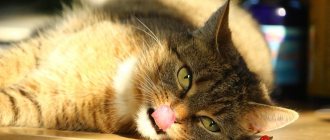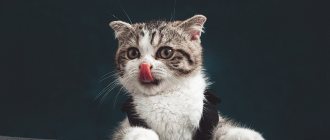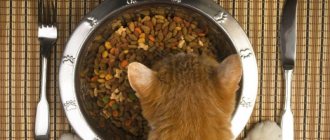Castration of a cat is a simple surgical operation to remove the testes, after which the animal recovers quickly. Neutered animals live several years longer and have a more good-natured character. However, the intervention increases the risk of developing genitourinary diseases. Why this happens and whether it can be prevented by changing your diet, we will tell you in this article.
Changes in a cat's life after castration
The testes of healthy and uncastrated cats produce sex hormones that literally “push” the animals to various kinds of adventures: active flirting with the opposite sex and defending territory. Having lost such an important organ after surgery, the pet is forced to change its area of interest and switch to food. This leads to overeating, weight gain and, as a result, cardiovascular problems. In addition, after castration of an animal:
- metabolism slows down;
- the balance of hormones changes;
- energy needs are reduced;
- Appetite increases by about 20%;
- the urethra narrows (especially when kittens are castrated before one year);
- the number of trips to the toilet decreases.
Such changes are natural, since sexual instincts do not dominate and are replaced by completely everyday desires - to sleep and have a satisfying meal. The owner’s task is not to indulge the pet, but to balance its diet and add physical activity.
The narrowing of the urethra after castration can lead to the fact that the small crystals that form are not excreted in the urine, but are deposited on the walls of the organs in the form of stones. The urethra in operated cats is very narrow, so even a small amount of sediment can completely block the urethra. The animal cannot go to the toilet and is in severe pain.
Difficulties with urination are also diagnosed in uncastrated cats. The reason is the predominance of phosphorus- and magnesium-containing products in the diet. But the lack of physical activity and obesity in animals that have undergone removal of the testes aggravates the problem.
The above consequences can be neutralized by adjusting the diet.
General feeding rules
After carrying out intervention on British, Scottish or other cat breeds, it is important for owners to determine exactly how the pet will eat: natural food or industrial food. Each technique has both advantages and disadvantages. For example, feeding a castrato with special ready-made food will enrich his body with the required vitamins and microelements. It is recommended that you always ask your veterinarian for advice on which complementary foods are best for your particular pet. Feeding natural food brings more difficulties into the life of the owner, since achieving the balance of substances required for a Scottish cat is quite difficult. Before switching an old or young cat to the correct diet, it is important for the owner to remember the following principles:
- The menu should not include less than 50% protein products.
- The amount of carbohydrates should be reduced to 30%.
- When choosing food, pay attention to the notes “For castrates” or “For the purpose of preventing urolithiasis.”
- Reduce the amount of food containing a lot of magnesium, phosphorus and calcium.
- Do not overfeed your pet. Give food no more than 5 times a day in small portions.
- If the animal is on regular natural food, you need to give it vitamin and mineral complexes.
- The cat should drink water often. It is recommended to boil or filter it.
How to properly feed a neutered cat
You cannot feed a castrated cat any food! This is the first rule that the owner must remember. For the well-being of your pet, the following principles should be followed:
- reduce as much as possible the consumption of foods containing calcium (milk, hard cheese, soy), magnesium (buckwheat, fish) and phosphorus (fish, seafood);
- Make sure your cat drinks enough fluid (the ratio of water to food should be 3:1);
- alternate wet and dry types of food if the animal prefers ready-made food (for example, offer canned food in the morning and evening, and give granules for lunch in your absence and at night);
- If you are gaining weight rapidly, reduce not the frequency of feedings, but the size of the serving. The daily intake of industrial food depends on weight and averages 40-70 grams for small individuals and 70-100 grams for more well-fed pets. The volume is divided into 3-4 times (for young cats) and 1-2 doses for adults;
- enrich your diet with vitamin complexes (especially important with a natural diet);
- control urine pH by taking tests every six months;
- don't overfeed. Although an abundance of food will please your pet, it will lead to the appearance of various diseases.
Let's consider what you need to feed a cat after castration surgery to prevent obesity and urolithiasis.
Ready-made feed
Factory-produced food is an ideal option that greatly simplifies the life of owners of neutered cats. The back of the package always indicates the recommended portion of food depending on the weight and gender of the animal. You need to focus specifically on this figure and not spoil your pet by giving it a “stomach festival.”
Veterinarians recommend choosing specialized food of good quality from the “premium”, “super-premium” or “holistic” segments with a special icon - “Sterilized Cat”. This food has a reduced content of fats and carbohydrates, but an increased concentration of proteins. They also contain substances that artificially reduce the acidity of urine and prevent the formation of stones.
Well-known brands have developed special lines for neutered cats, taking into account the nutritional characteristics of such animals:
- in the premium segment these are Pro Plan, Hills Feline, Royal Canin;
- among the “super-premium” level feeds there are 1st Choice, Eukanuba, Bosch Sanabelle;
- from the “holistic” category - Grandorf, Farmina, Pronature Holistic, Acana.
Budget brands (Whiskas, Kitikat and others) are popular precisely because of their low cost. However, the food of these brands contains not very high-quality ingredients. Their frequent consumption has a negative impact on the health of pets. However, when purchasing any food, even high-end food, you should not hope that your cat will like the food right away. A suitable option must be sought experimentally, offering the animal various brands.
Remember that the menu of a neutered cat should include not only dry food, but also canned food in a ratio of 70:30. It is better to choose products from one brand, since the composition even among brands of the same segment varies significantly.
Dry granules are stored for a long time and have an optimal ratio of proteins, fats, carbohydrates, vitamins and minerals. Solid food is necessary to prevent problems with teeth and gums. But with this type of diet, cats drink more liquid, so you need to constantly monitor the fullness of the water bowl.
The animal’s diet should also include wet food, which:
- sold in portioned bags designed for 1-2 times, so the risk of overeating is minimal;
- contains a lot of moisture to maintain the body's water balance and prevent diseases of the urinary system;
- presented in a wide range of different tastes and textures (sauces, jellies, soups).
Ready-made food is well balanced and provides the animal with all the nutrients necessary for good health. But you should not overfeed your pet, for which it is recommended to measure portions using a special cup (there is a scale on it). After the age of 7, the daily ration is reduced by approximately 200-300 grams to prevent obesity and problems with the cardiovascular system.
Natural food
If you feed a castrated cat regular food, then you need to take care of the correct diet, which is based on:
- meat and poultry that provide protein and B vitamins. Choose low-fat types - chicken, rabbit, beef, turkey;
- meat by-products cannot completely replace meat, but are necessary to expand the menu. These are chicken (or turkey) liver and ventricles, beef tongue, lungs and heart;
- oatmeal, rice, buckwheat and millet porridge;
- seasonal vegetables (make up 10-15% of the daily diet). You can offer cats carrots, beets, zucchini, pumpkin, cauliflower, broccoli, greens and spinach. Potatoes contain a lot of starch, so it is better to exclude them from the menu;
- fermented milk products with a low percentage of fat (cottage cheese, acidophilus, kefir, fermented baked milk and yogurt);
- chicken and/or quail eggs. The former are boiled, and the latter are offered raw 1-2 times a week.
Unprocessed fresh meat or offal is not recommended. First, the tenderloin or fillet is cut into portions, boiled in unsalted water, finely chopped and mixed with the finished porridge. Vegetables are grated, greens are chopped, and then mixed with porridge or meat. Sprouted grains (oats, wheat, barley) are given to cats to maintain stomach function.
Young castrates are fed 3-4 times a day, adults – 1-2 times. The daily requirement is 30-40 grams per 1 kg of weight. The resulting figure is divided by the recommended number of meals. Even if the cat is begging for food, looking at you with sad eyes, do not give in to manipulation. It is better for the animal's health if it remains a little hungry.
Don't give food from your table! In addition, the following foods should not be present in the diet:
- fatty pork;
- fish (especially sea fish);
- ready-made canned food;
- milk;
- flour products;
- semi-finished and smoked products;
- legumes and pasta.
Fatty fish (sea fish) contains a huge amount of phosphorus, so it should be completely excluded from the animal’s daily menu! Smoked or salted foods increase the risk of developing urolithiasis in an operated cat.
Special food or natural products?
Only the owner of a neutered cat can make a choice between natural feeding and food created in industrial conditions. If you choose a finished product, you should buy only one brand. It is important to choose specialized food for neutered cats correctly.
It is best if your pet eats a varied diet. Therefore, it is advisable to sometimes alternate dry food with canned food. If the owner decides to give his pet natural food, you can sometimes give dry bait.
It is worth remembering that it is very difficult to maintain the correct balance in the food of castrated and sterilized pets from natural products. Ready-made dry food is developed by specialists; it takes into account all the special needs of each pet. Therefore, such food contains everything that is necessary not only for the health, but also for the good mood of our cats.
Preventing complications with nutrition
Fight obesity
Most pets stop being active after surgery, spend a lot of time lying down, and constantly strive to beg the owner for a treat, so obesity is one of the most common problems. If the owner takes all the required preventative measures, it will be possible to significantly increase the life expectancy of the animal. First of all, it is important to remember that the cat is fed small portions at least 4 times a day. You shouldn’t follow pets’ lead, even in a situation where they try to beg for food. Twice a month, veterinarians recommend holding a fasting day for cats.
Urolithiasis disease
To prevent stones from appearing in the kidneys or bladder, the owner will need to exclude from the pet’s diet foods rich in calcium, magnesium and phosphorus, which provoke the formation of stones. After surgery, the pet's urethra narrows, so even sand and small stones cannot leave the body naturally. In order to prevent urolithiasis, drinking plenty of fluids will also help. The ratio of food and water is 1 to 3. For 10 g of food, the cat should drink at least 30 ml of water.

